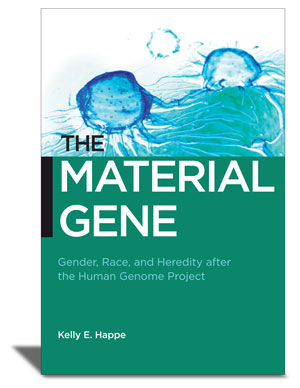In 2000, the National Human Genome Research Institute announced the completion of a “draft” of the human genome, the sequence information of nearly all 3 billion base pairs of DNA. Since then, interest in the hereditary basis of disease has increased considerably.
In The Material Gene: Gender, Race, and Heredity after the Human Genome Project, author Kelly E. Happe considers the implications of this development. Beginning with the argument that eugenics was an ideological project that recast the problems of industrialization as pathologies of gender, race and class, the book traces the legacy of this ideology in contemporary practices of genomics. Happe, assistant professor of communication studies and women’s studies, maps the ways in which the hereditarian body is the new site whereby economic injustice, environmental pollution, racism and sexism are implicitly reinterpreted as pathologies of genes and by extension, the bodies they inhabit.


